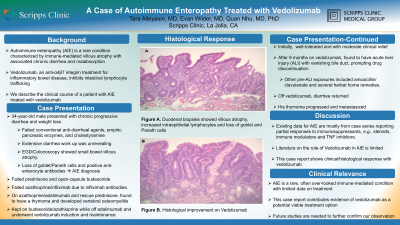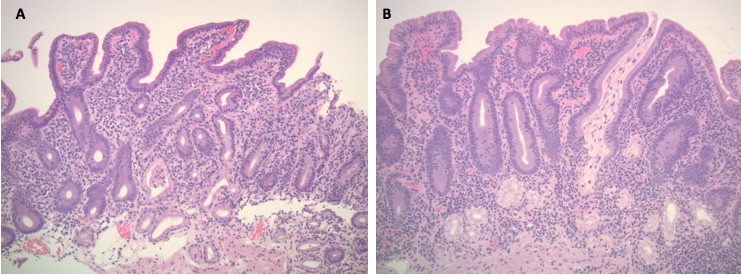Sunday Poster Session
Category: Small Intestine
P1546 - A Case of Autoimmune Enteropathy Treated With Vedolizumab
Sunday, October 27, 2024
3:30 PM - 7:00 PM ET
Location: Exhibit Hall E

Has Audio
- TA
Tara Alleyasin, MD
Scripps Clinic
La Jolla, CA
Presenting Author(s)
Tara Alleyasin, MD1, Evan Wilder, MD2, Quan Nhu, MD, PhD1
1Scripps Clinic, La Jolla, CA; 2Scripps Clinic, San Diego, CA
Introduction: Autoimmune enteropathy (AIE) is a rare condition characterized by immune-mediated villous atrophy with associated chronic diarrhea and malabsorption. Vedolizumab, an anti-ɑ4b7 integrin treatment for inflammatory bowel disease, inhibits intestinal lymphocyte trafficking, and therefore may have a role in treating AIE. In this case report, we describe the clinical course of a patient with AIE treated with vedolizumab.
Case Description/Methods: A 34-year-old male presented with chronic, progressive diarrhea and weight loss. He had failed treatment with conventional anti-diarrheal agents, empiric pancreatic enzymes, and cholestyramine. Negative workup included: infectious stool studies, elastase, calprotectin, celiac serology, endocrinopathy/neuroendocrine tumor screening, CT imaging including CT enterography. EGD and colonoscopy were notable for villous atrophy/erosions in the terminal ileum. Biopsies of the ileum/duodenum showed villous atrophy, increased intraepithelial lymphocytes, apoptosis, and loss of goblet/Paneth cells (Fig. 1A). Additional intraepithelial lymphocytosis and loss of goblet cells was also seen in the colon. Anti-enterocyte antibodies were positive, and a diagnosis of AIE was made.
Initial treatments included prednisone and open-capsule budesonide with minimal response. Subsequent treatments included azathioprine, budesonide, and infliximab, as well as adalimumab due to infliximab antibodies. On immunosuppression, patient was found to have a thymoma, and was inconsistently on azathioprine, adalimumab, and prednisone. These were discontinued in the setting of spinal osteomyelitis. Subsequently, patient was placed on budesonide/azathioprine, and finally underwent vedolizumab induction, with 300 mg maintenance dose. On vedolizumab, he showed significant clinical and histological improvement (Fig. 1B). Though initially well-tolerated, after 9 months the patient developed acute liver injury with vanishing bile duct, leading to discontinuation of vedolizumab.
Discussion: AIE is a rare, often-overlooked immune-mediated condition with limited data on treatment. Data are mostly from case series, suggesting partial response to immunosuppresants such as steroids, immune modulators, and TNF inhibitors. There is very limited literature on effective treatment with vedolizumab. This case report of clinical/histological response to vedolizumab helps contribute to the evidence for it as a viable treatment option and suggests the need for future studies to further confirm this.

Disclosures:
Tara Alleyasin, MD1, Evan Wilder, MD2, Quan Nhu, MD, PhD1. P1546 - A Case of Autoimmune Enteropathy Treated With Vedolizumab, ACG 2024 Annual Scientific Meeting Abstracts. Philadelphia, PA: American College of Gastroenterology.
1Scripps Clinic, La Jolla, CA; 2Scripps Clinic, San Diego, CA
Introduction: Autoimmune enteropathy (AIE) is a rare condition characterized by immune-mediated villous atrophy with associated chronic diarrhea and malabsorption. Vedolizumab, an anti-ɑ4b7 integrin treatment for inflammatory bowel disease, inhibits intestinal lymphocyte trafficking, and therefore may have a role in treating AIE. In this case report, we describe the clinical course of a patient with AIE treated with vedolizumab.
Case Description/Methods: A 34-year-old male presented with chronic, progressive diarrhea and weight loss. He had failed treatment with conventional anti-diarrheal agents, empiric pancreatic enzymes, and cholestyramine. Negative workup included: infectious stool studies, elastase, calprotectin, celiac serology, endocrinopathy/neuroendocrine tumor screening, CT imaging including CT enterography. EGD and colonoscopy were notable for villous atrophy/erosions in the terminal ileum. Biopsies of the ileum/duodenum showed villous atrophy, increased intraepithelial lymphocytes, apoptosis, and loss of goblet/Paneth cells (Fig. 1A). Additional intraepithelial lymphocytosis and loss of goblet cells was also seen in the colon. Anti-enterocyte antibodies were positive, and a diagnosis of AIE was made.
Initial treatments included prednisone and open-capsule budesonide with minimal response. Subsequent treatments included azathioprine, budesonide, and infliximab, as well as adalimumab due to infliximab antibodies. On immunosuppression, patient was found to have a thymoma, and was inconsistently on azathioprine, adalimumab, and prednisone. These were discontinued in the setting of spinal osteomyelitis. Subsequently, patient was placed on budesonide/azathioprine, and finally underwent vedolizumab induction, with 300 mg maintenance dose. On vedolizumab, he showed significant clinical and histological improvement (Fig. 1B). Though initially well-tolerated, after 9 months the patient developed acute liver injury with vanishing bile duct, leading to discontinuation of vedolizumab.
Discussion: AIE is a rare, often-overlooked immune-mediated condition with limited data on treatment. Data are mostly from case series, suggesting partial response to immunosuppresants such as steroids, immune modulators, and TNF inhibitors. There is very limited literature on effective treatment with vedolizumab. This case report of clinical/histological response to vedolizumab helps contribute to the evidence for it as a viable treatment option and suggests the need for future studies to further confirm this.

Figure: Duodenal biopsies pre (A) and post (B) vedolizumab
Disclosures:
Tara Alleyasin indicated no relevant financial relationships.
Evan Wilder indicated no relevant financial relationships.
Quan Nhu: Regeneron – Advisory Committee/Board Member, Speakers Bureau. Sanofi – Advisory Committee/Board Member, Speakers Bureau. Takeda – Advisory Committee/Board Member.
Tara Alleyasin, MD1, Evan Wilder, MD2, Quan Nhu, MD, PhD1. P1546 - A Case of Autoimmune Enteropathy Treated With Vedolizumab, ACG 2024 Annual Scientific Meeting Abstracts. Philadelphia, PA: American College of Gastroenterology.
